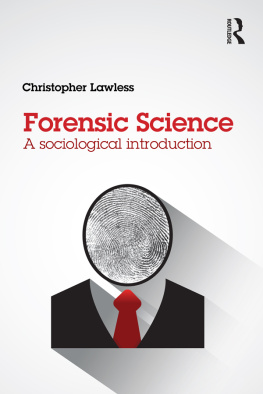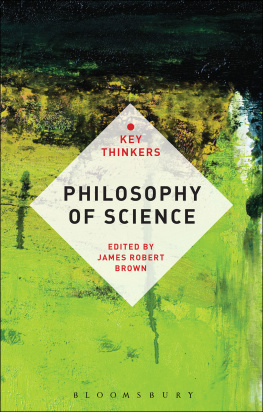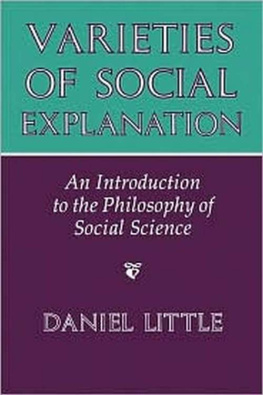ROUTLEDGE LIBRARY EDITIONS: SOCIAL THEORY
Volume 55
THE RATIONAL AND THE SOCIAL
First published in 1989
This edition first published in 2015
by Routledge
2 Park Square, Milton Park, Abingdon, Oxon, OX14 4RN
and by Routledge
711 Third Avenue, New York, NY 10017
Routledge is an imprint of the Taylor & Francis Group, an informa business
1976 Routledge & Kegan Paul Ltd
All rights reserved. No part of this book may be reprinted or reproduced or utilised in any form or by any electronic, mechanical, or other means, now known or hereafter invented, including photocopying and recording, or in any information storage or retrieval system, without permission in writing from the publishers.
Trademark notice: Product or corporate names may be trademarks or registered trademarks, and are used only for identification and explanation without intent to infringe.
British Library Cataloguing in Publication Data
A catalogue record for this book is available from the British Library
ISBN: 978-0-415-72731-0 (Set)
eISBN: 978-1-315-76997-4 (Set)
ISBN: 978-1-138-78409-3 (Volume 56)
eISBN: 978-1-315-76343-9 (Volume 56)
Publishers Note
The publisher has gone to great lengths to ensure the quality of this reprint but points out that some imperfections in the original copies may be apparent.
Disclaimer
The publisher has made every effort to trace copyright holders and would welcome correspondence from those they have been unable to trace.
Preface to the Reprinted Edition
It has been about twenty-five years since this book first appeared. Much has changed. It was written at a time when those of us who took reason and evidence seriously were doing battle with social constructivists. Of course, champions of constructivism would have objected to the way I just put it, saying they, too, believe in reason and evidence. It is true; they did. But they put it in a social form, robbing it of the normative force that rationalists took to be crucial. The trick at the time was trying to convince readers that reason is a thing in its own right, while also allowing for the presence of genuine social factors that shaped the development of science.
Im not, however, interested in refighting those battles. Much more interesting is the way that things have developed. Philosophers of science today pay more attention to social factors than they did. They owe their enriched views in part to sociologists of knowledge and in part to feminist critiques. On the other hand, social constructivists, including the ones discussed in this book and the newer generation, are much more sensitive to reason and evidence, even if it is not discussed specifically in those terms. It would be going too far to say there has been a complete convergence of views. But each side now profits considerably from the work of the other. I would be pleased to think the original edition of this book played a tiny role in this happy outcome.
James Robert Brown
Toronto, November 2013
For those I grew up with
my father, Andrew
my mother, Isabel
my brother, Alan
my sister, Andre
my brother, Gordon
First published in 1989 by Routledge
11 New Fetter Lane, London EC4P 4EE
29 West 35th Street, New York NY 10001
1989 James Robert Brown
Typeset in Baskerville by Columns of Reading
Printed in Great Britain by
T. J. Press (Padstow) Ltd, Padstow, Cornwall
All rights reserved. No part of this book may be reprinted or reproduced or utilized in any form or by any electronic, mechanical, or other means, now known or hereafter invented, including photocopying and recording, or in any information storage or retrieval system, without permission in writing from the publishers.
British Library Cataloguing in Publication Data
Brown, James Robert
The rational and the social.
(Philosophical issues in science).
1. Philosophy of science. Theories
I. Title II. Series
Library of Congress Cataloging in Publication Data
Brown, James Robert
The rational and the social.
(Philosophical issues in science).
Bibliography: p.
Includes index.
1. Knowledge, Sociology of. 2. SciencePhilosphy.
3. ScienceSocial aspects. 4. Rationalism.
5. HistoryPhilosophy. I. Title. II. Series.
BD175.B76 1989 121 8824211
ISBN 0415029058
__________________
CONTENTS
__________________
__________________
__________________
Ever since Plato took up the cudgels against Protagoras, when the latter said that man is the measure of all things, the battle over relativism has been fought again and again. It may seem like an endless cycle of claims and counter-claims, but we would be mistaken to think that nothing is ever learned in any of the successive clashes.
Among the main contenders in the present debate are, on the one hand, a small but vigorous and influential group of sociologists and historians of science centred in Edinburgh. They preach (and practise) a radically sociological approach to the understanding of how knowledge (scientific knowledge, in particular) is acquired. On the other side of this debate are their rationalist opponents, including most philosophers of science and traditional historians of ideas. They see evidence, good reasons, and rational belief rather than non-cognitive interests as the guiding force behind the development of science.
This book is a contribution to the present debate. It is, for the most part, squarely on the rationalist side. The first chapter is an exposition of the new sociological way of doing things, the so-called strong programme for the sociology of knowledge. This chapter is followed by two more devoted to critically examining some of the chief tenets of the sociological movement. David Bloors science of science and Barry Barness finitism are the main targets of chapters two and three, respectively. Some special topics in experimentation come up in the fourth chapter. The anthropological metaphor comes into play in the fifth and especially the sixth chapters, which are mainly about the role history might play in determining just what rationality is. The account given leads to a richer, and I think proper, way of understanding how science works. It is at this point that we begin to get a glimmer of how the social really enters science. Its penetration is quite significant, but its locus is not where the present debate between rationalists and sociologists is usually focused. The final chapter is devoted to this issue and, in particular, to what we might do about it; that is, its about philosophical interventions to make science better.
That, in brief, is what the present book is about, but a preface should say something more; it should also say something about the authors larger intentions and motivations. I find that I have several. One of my concerns is to defend the old ideal of knowledge for its own sake; but holding forth on this invariably induces cynicism or yawning, so the topic is best avoided. (Of course I do not wish to defend a childish view of the purity of science, and would readily admit that sociologists have taught us much about the sorts of things we must avoid in defending such an ideal.)
The other motivation has to do with political concerns. I am convinced that the social goals many of us hanker after, namely, a socialist world with equality among the classes, sexes, and races, is best served by rationality. It is true that some scientific theories (often pseudo-scientific, I would claim) have done considerable harm. Lots of biological theories, for instance, have been racist or sexist or have been used in defence of the most pernicious forms of free enterprise. This is undoubtedly why so many who share my political goals find themselves attracted to the sociologists account of science. (There are speculations along this line about the sociologists motives in the second chapter.) I am quite persuaded, however, that such a view is mistaken, even dangerously so, for the scepticism and relativism which result from it tend to produce a quietism and inaction rooted in a sense of hopelessness and pointlessness. One of the great forces for evil today is the religious right. Its members clamour for equal time with Darwin for special creation, since after all, both are just theories, as Ronald Reagan put it. This, of course, is merely a front for a not-so-hidden agenda; the suppression of women, trade unions, and third-world people is part of the bargain. Several relativist-minded sociologists of knowledge despise these political trends just as I do, but how are they to fight the battle? By saying, Yes, all theories are equally good; they merely serve different social interests? Surely we can do better than that.





